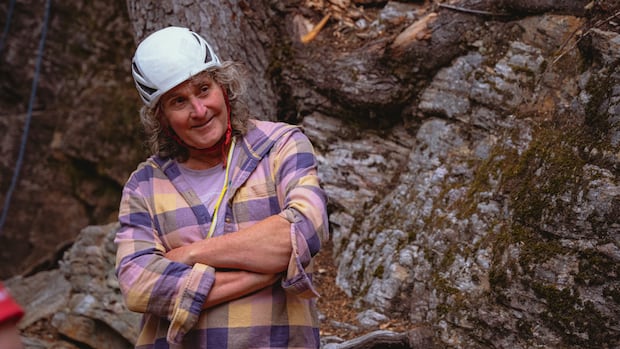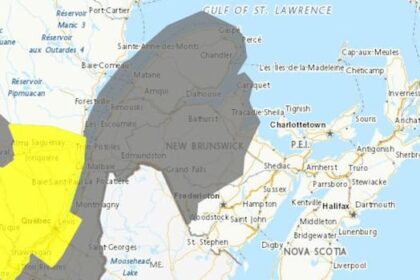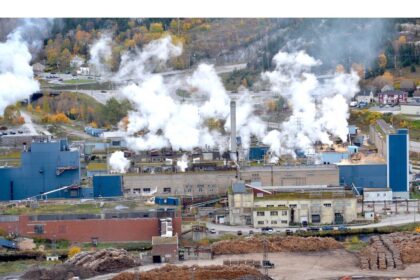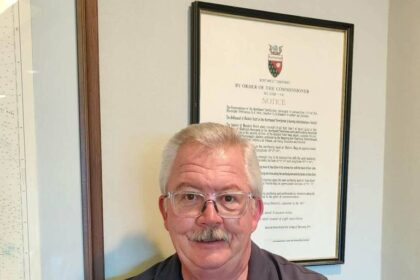British ColumbiaAfter she retired from mountain guiding, Julianna Howatt came out as a transgender woman. Now, she and others are working to remove barriers for people who may have been told they don’t belong in the wilderness. B.C.’s Julianna Howatt is supporting underrepresented youth to discover the outdoorsListen to this articleEstimated 5 minutesThe audio version of this article is generated by text-to-speech, a technology based on artificial intelligence.Julianna Howatt spent four decades as a mountain guide, navigating glaciers while fearing her identity as a transgender woman would be revealed. (Maia Christian/Submitted)A backcountry guide with more than four decades of experience says while in the alpine, she was more afraid of being outed as a transgender woman, than she was of avalanches. Julianna Howatt worked as a professional mountain guide in B.C. and Alberta’s most dangerous terrain for most of her life.During that time, she says, she outwardly embodied the stereotypes of a mountain guide in the muscled, masculine body that she was born with.Julianna Howatt found climbing, a fringe sport, as an outlet. (Julianna Howatt/Submitted)Inside, Howatt knew that she identified as a woman. “I compartmentalized it. I would push it away,” Howatt said. “In those quiet moments at night or driving somewhere, it would hit me head on. Holy smokes, if people knew who I was. This is all going to come crashing down.”It was only after she retired from guiding, and while recovering from a traumatic climbing accident, that she decided to come out as a transgender woman. Now, Howatt is working to remove barriers to the outdoors and to encourage adventure for people who feel like they do not belong or feel safe in the wilderness.Julianna Howatt now works to mentor others to become active in the backcountry. (Nat Segal/Submitted)Her story is documented in the film Beauty in a Fall, which premiered at the Banff Film Festival on Nov. 8.“Maybe by being vulnerable and sharing this story, maybe it’ll help people feel something and foster connection.” Howatt describes her high school self as a loner who suffered from bullying. It was only while climbing mountain cliffs that she felt confident and free. She started rock climbing as a teenager in the late 1970s, when it was considered a fringe sport. Julianna Howatt found the mountains at a young age. There, in the alpine, she felt free. (Julianna Howatt/Submitted)“It was where I felt belonging. I could be fully me in the mountains.”Fuelled by a love of climbing, skiing and alpinism, Howatt became a guide at a young age. As she ventured into increasingly dangerous terrain with the responsibility of guiding groups on her shoulders, her fears of being exposed as a transgender woman – and what that would mean for her career, friendships and safety – grew. It was in the moments of calm — during mountainside breaks and evenings in cozy alpine cabins that cruel jokes, harsh comments and vulgar remarks reminded Howatt why she had to live in secret.“It was like death from a thousand cuts,” Howatt said. When possible, Howatt would sneak away to express her femininity through dance. “It became this secret life where I would travel to places and lived authentically as Juliana. But then I came back home to my guide world, and back into disguise.”This is an image of Julianna Howatt climbing in her youth in what she refers to as her “boy body.” (Julianna Howatt/Submitted)Four years ago, Howatt decided it was time to live authentically and come out to the world as a transgender woman. While filming the documentary, Howatt returned to a place where she had worked as a guide for 24 years. During the visit, she felt ostracised by the people who were once her peers.“In some ways, I think it’s worse than I ever thought it would be… It became really obvious that many of the guests would refuse to be guided by me.”Mountains and masculinityThe guiding industry is largely made up of straight white men, who embody a specific type of “mountain masculinity,” said to Rachel Reimer, who has a PhD in social science and studies psychology and safety in the mountains. Rachel Reimer, PhD is a social scientist based in Revelstoke B.C. (Zoya Lynch/Submitted)By contrast, marginalized people — including 2SLGBTQ+ communities, racialized people and women — and those that don’t fit the stereotype are automatically considered less competent, Reimer said. In her research into the safety of underrepresented and marginalized people in the mountain guiding profession, Reimer found that people who do not embody “mountain masculinity” must consider both mountain hazards, and interpersonal hazards like exclusion and conflict, before speaking up in the alpine.Reimer is also the founder and president of the Open Mountains Project in Revelstoke, B.C., a non-profit that is dedicated to fostering inclusive mountain culture and removing barriers to accessing the outdoors — offering scholarships, community, rental equipment and training at discounted rates.Open Mountains Project is a non-profit society in Revelstoke, B.C., dedicated to fostering inclusive mountain culture. (Rachel Reimer/Submitted)“We all belong in the outdoors. We all belong in the mountains,” Reimer said. Today, Howatt is on the board of directors with the Open Mountain Project, where she offers mentorship. Amid the ongoing oppression of trans people, Howatt says she wants to empower trans and non-binary youth to engage in outdoor sports.”Whether it’s on rivers, rock or snow, the mountains don’t care how you identify. It’s there for everyone. “
This trans mountain guide wants everyone to feel welcome in the backcountry after she hid for decades











